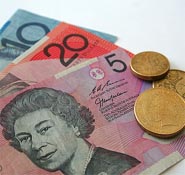Australia first to put brakes on lifting economy
 Sydney - Australia's central bank Tuesday raised interest rates, making the country the first developed nation hit by the global financial crisis to put the brakes on a rising economy.
Sydney - Australia's central bank Tuesday raised interest rates, making the country the first developed nation hit by the global financial crisis to put the brakes on a rising economy.
For the first time since March 2008 Australia's Reserve Bank lifted official cash interest rates by 25 basis points. They had been at a record low of 3 per cent for the past five months.
The move demonstrated the bank is confident the worst of the crisis was over and that Australia's economy is in danger of taking off at too fast a pace, risking inflation.
Job advertisements increased 4.4 per cent in September, following a 4.1-per-cent increase in August, a sign that the labour market and the broader economy was moving into a recovery phase.
Australia has weathered the economic crisis better than most countries around the world because of lucrative mineral exports and a hefty government stimulus, analysts said.
"Economic conditions in Australia have been stronger than expected and measures of confidence have recovered," said central bank governor Glenn Stevens. "[The] basis for such a low interest rate setting has now passed."
Treasurer Wayne Swan said the rate increase was a sign the country's economy was outperforming the rest of the world.
"Of course it is the case that Australia is outperforming other advanced economies, and I guess many economists will see the decision today as a consequence of economic recovery," Swan said in Canberra.
But Swan acknowledged the increased interest rate would be painful for people paying mortgages and in personal debt.
He urged banks not to raise variable mortgage rates by more than the 25 basis points, but said he believed homeowners understood the need for appropriate interest rates.
"They do know that 50-year lows can't last forever," Swan said.
Swan emphasized that the global economic outlook was still fragile, and growth was below trend.
This meant government stimulus measures, including low interest rates, could not be fully withdrawn yet.
"We must still keep in place expansionary monetary and fiscal policy," Swan said.
Economist Su-Lin Ong of RBC Capital Markets said it was clear the Reserve Bank was increasingly comfortable the growth outlook appeared durable.
"They talk about a return to close-to-trend growth in the year ahead so obviously Australia is proving resilient throughout all of this." (dpa)